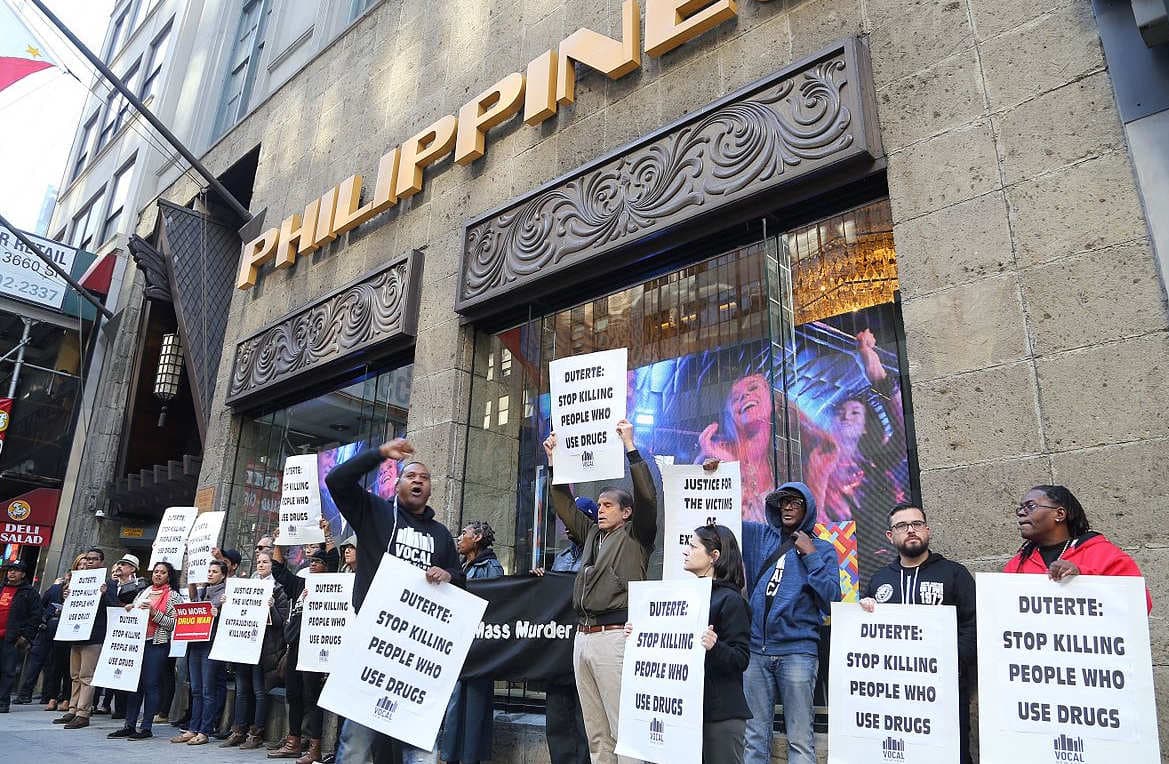Philippine Drug War Turns Bloodier, Trickier
Janess Ann Ellao
October 12, 2017

MANILA, Philippines (VIAnews) – Statistics on the number of casualties in the Philippines’ war on drugs continue to grossly escalate. Its implementers, the country’s national police, are at the lead of once again convoluting public opinion, critics say, with its recent claim that there are no extrajudicial killings in the country.
“All recent administrations have denied the existence of State-sanctioned killings or have deliberately downplayed the extent of the problem on human and people’s rights. It is laughable that the Philippine National Police claimed only one extrajudicial killing in the course of Duterte’s term, and even retracted their statement to insinuate that there are no such incidents of extrajudicial killing in the country,” Cristina Palabay, secretary general of human rights group Karapatan, said.
A Philippine National Police spokesman said last week that there are no cases of extrajudicial killings in the country, despite reports that over 12,000 have been killed due to the Philippine government’s bloody war on drugs. Critics say that most of those killed are mere street peddlers while others have been attested by their relatives and friends for being in the process of mending their ways or to have never touched a single iota of illegal drugs.
Those killed are either from police operations, where victims allegedly put up a fight while being arrested. Others were gunned down in their homes, in the streets, in the wee hours and even in broad daylight by unidentified assailants. Still, others were found dead and their remains bore signs of torture and desecrated beyond recognition – sometimes wrapped in packing tape with a signage that read, “I am a drug peddler.”
These drug-related killings have been met with criticisms both here and in the international community. But Philippine president Rodrigo Duterte, who has been waging a bloody war on drugs since he stepped into power, remains unfazed and has, in the past, even threatened the United Nations, the European Union, and the human rights community for expressing indignation over the killings. Instead of coming clean, Duterte has admitted publicly that he has, as the mayor of the Southern city of Davao, personally killed suspects “just to show the police that if I can do it, why can’t you?”
While such stories have filled the news every day since the Duterte administration has ushered in, police chief Gen. Ronald Dela Rosa imputed that the labeling of drug-related killings as “extrajudicial killings” was only meant to arouse public sentiment against the government, quipping that, “It’s very obvious.”
Dela Rosa furthered that a victim of “extrajudicial killings” must either be a member of a cause-oriented group or of the media, referring to its definition as stipulated in an administrative order forged during the previous administration. He argued that those killed for their alleged involvement in the illegal drugs are neither member of a cause-oriented group nor the media.
Such pronouncement has been met with outrage.
“This government seems to think that playing with definitions would rid them of the reality facing the whole country. What is crystal clear is that Duterte and his State security forces have perpetrated and intensified scores of rights violations with impunity,” Palabay said.
Palabay said that the “continuous denial and deliberate propelling of blatant and preposterous lies are meant to justify the killings and violations it has systematically allowed through State policies such as the drug war campaign and counterinsurgency program Oplan Kapayapaan.”
Meanwhile, Mon Ramirez, an activist during the martial law rule under the late strongman Ferdinand Marcos, could not help but like such pronouncement to the days of the dark era of Philippine history, when Marcos denied in his media interview that there were tortures and other human rights violations happening in the country.
Apart from drug-related killings, human rights organizations such as Karapatan also documented 98 extrajudicial killings, where most are indigenous peoples and farmers. This has recently been brought before the United Nations for the Universal Periodic Review, where the Philippine government, as in the past, merely noted and rejected those that pertain to State actors’ accountability on rights violations.
“If the Duterte administration continues to desperately dismiss the existence of extrajudicial killings and other rights violations, despite overwhelming reports from human rights and people’s organizations within the country and concurrence from other governments, its delusional denial is clear proof that it has no qualification nor credibility to be a member of an international human rights body such as the UN Human Rights Council,” said Palabay.
